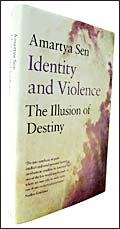 |
BLUELIST
Lonely Planet
Publications
Pp: 328
Price: Rs 900 |
It's
every family's annual nightmare: deciding where to go for the
holidays. The kids want to go to South Africa, because that's
where their classmates spent their last vacation; the wife is
pushing for Dubai because she has a sister there (shopping for
gold is not the reason, she says vehemently), but you have your
heart set on Hawaii. Lonely Planet's hot new Bluelist may not
solve your travel problems, but it will certainly make reaching
a consensus easier. The Bluelist is no ordinary listing of travel
destinations. Rather, it's a list of travel recommendations ("618
things to do and places to go"), sliced and diced every which
way. Lonely Planet publisher, Roz Hopkins, explains why they had
to come up with a new verb (yep, like Google, Bluelist hopes to
be a verb): "We created this because there is no word to
describe what we set out to do with this new book, which is to
'create an evolving selection of classic and current travel experiences
and destinations selected by Lonely Planet staff, authors and
travellers'."
The result is an astonishing, intriguing
and impressive travel directory. Where should you go if you wanted
to see "most history per square mile"? The top three
destinations, in the order mentioned, would be Rome (Italy), China,
and Jerusalem (Israel). How about "The world's best booze
and where to drink it?" That would be nihonshu, or sake,
in Japan, followed by Guinness in Ireland, and beer in Belgium.
And where would be you be better off if you wanted to simply streak?
Onsen in Japan, Australia's Maslin Beach, or even Berlin's Tiergarten
Park.
But the fun with Bluelist, to be updated
every year, doesn't stop there. Lonely Planet's travel writers
even tell you where you are likely to encounter the dodgiest scams.
The locations range from Spain to China to, of course, India and
the us, but no one can beat the Italians when it comes to conning.
Here's the most popular Italian tourist scam as detailed by the
Bluelist: "A woman holding a 'baby' trips; you lunge to catch
the infant; your pockets are thoroughly picked by an accomplice
as the 'mother' vanishes into thin air; and you realise you've
been had when you stare into the baby's lifeless, artificial eyes".
Thanks to its enthusiastic editors and contributors,
the book is packed with several other travel tidbits and, sometimes
exasperating, trivia. For instance, did you know that, the Bluelist
informs us, Slovakia sends around 600 kg of wrongly addressed
mail back to Slovenia? That information is unlikely to prompt
or discourage your trip to Slovakia. But if you ever did find
yourself in that country, you'll almost certainly be reminded
of its peculiar postal problem. Not to mention the Bluelist.
 |
IDENTITY AND VIOLENCE
THE ILLUSION OF DESTINY
By Amartya Sen
Allen Lane
Pp: 215
Price: Rs 295 |
Amartya
sen is justifiably respected around the world as an economist,
academician, scholar and author. He has another identity: of a
card holding liberal intellectual. His latest book, Identity and
Violence, The Illusion of Destiny, is full of the angst he experiences
in that last avatar. Sen argues that a distorted and uni-dimensional
sense of identity is behind much of the violence that is wracking
the world. Sectarian violence-in West Asia, Timor, Bosnia and
Iraq-feeds on this perceived primary sense of identity, which
subsumes all the others. He goes on to say religious or racial
identities are not inherently more important than others based
on profession, aptitude, ability or choice. Sen was an eye witness
to the massacres and mayhem that accompanied India's partition,
and so, brings a first person perspective to the issue.
The book also holds up a mirror to the fissures
and fault lines that divide the world and directly challenges
Samuel Huntington's clash of civilisations thesis. But its implied
message that we must, as individuals, rise above these cultivated
divisions and do the right thing is what makes it wooly-liberal
in the end.
|





